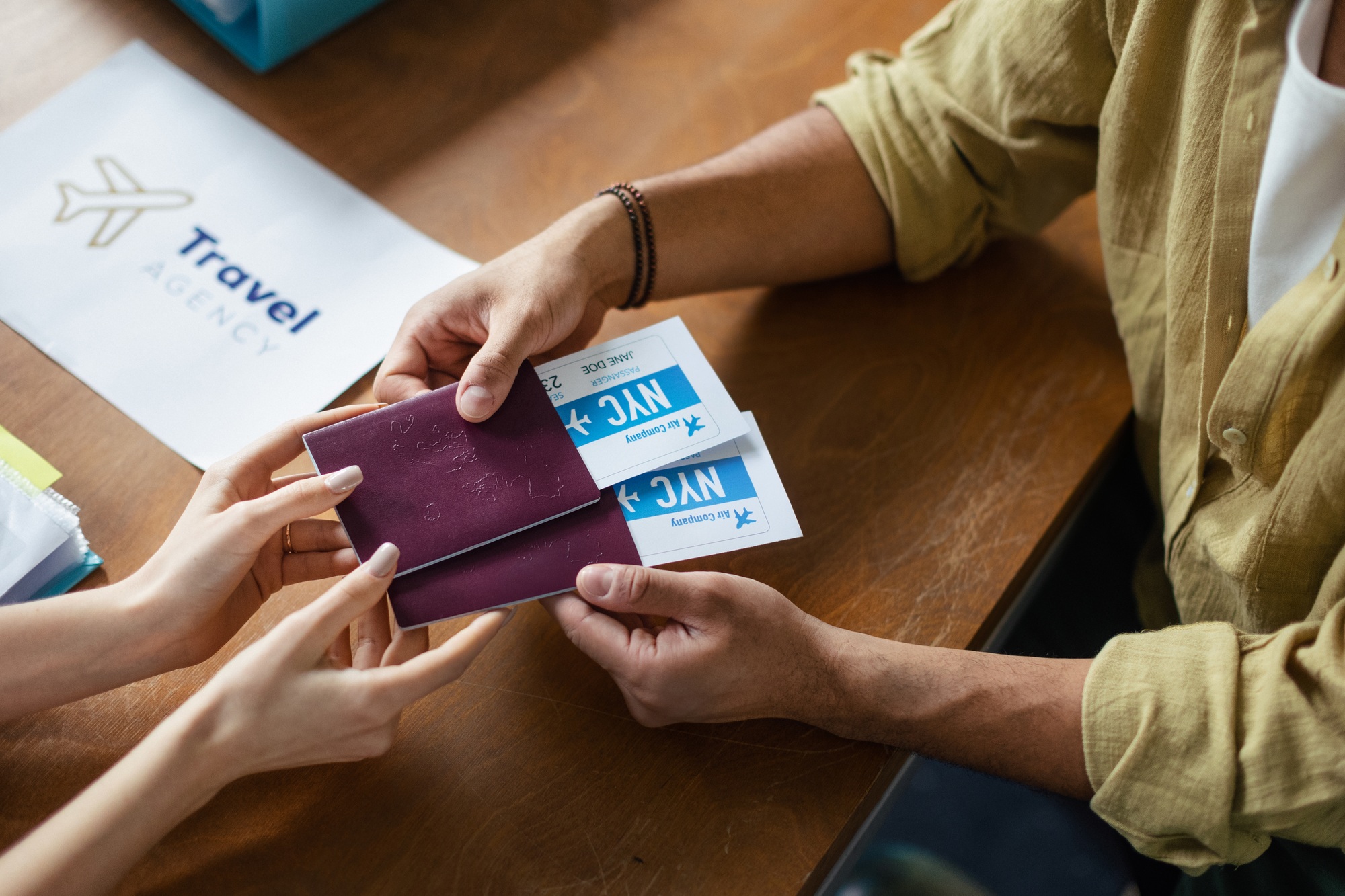Key Takeaways

- Conduct Thorough Market Research: Understand your target audience, analyze competitors, and stay informed about travel trends to effectively position your travel agency.
- Develop a Strong Business Plan: Create a comprehensive plan that outlines your mission, services, financial projections, and marketing strategies to guide your agency’s growth.
- Define Your Niche: Specialize in a specific travel segment, such as adventure or luxury travel, to attract a loyal customer base and differentiate your agency from competitors.
- Ensure Legal Compliance: Register your business, choose a suitable structure, and obtain necessary licenses and permits to operate legally and build credibility.
- Build a User-Friendly Online Presence: Set up a professional website with booking capabilities, utilize SEO techniques, and engage on social media to enhance visibility and attract clients.
- Prioritize Customer Service: Deliver exceptional service to foster client satisfaction and loyalty, encouraging repeat business and referrals through effective complaint resolution and continuous feedback collection.
Starting a travel agency can be an exciting venture that allows you to turn your passion for travel into a thriving business. With the world becoming more interconnected and travel options expanding, there’s never been a better time to dive into this industry. Imagine helping others create unforgettable experiences while building a successful brand of your own.
How to Start a Travel Agency

Starting a travel agency involves several key steps that transform your passion for travel into a profitable small business. Follow these steps to create a successful travel agency.
- Conduct Market Research
Identify target customers and understand their travel preferences. Analyze local competitors and their services. Gather data about popular travel destinations and emerging trends.
- Develop a Business Plan
Create a comprehensive business plan. Include your agency’s mission statement market analysis financial projections and marketing strategies. Outline startup costs and ongoing expenses.
- Choose Your Niche
Select a specific niche that differentiates your agency from others. Consider focusing on adventure travel luxury travel family vacations or corporate travel. Specializing attracts a dedicated customer base.
- Register Your Business
Register your travel agency with the appropriate local and state authorities. Obtain required licenses and permits. Ensure compliance with federal regulations such as IATA or CLIA if needed.
- Set Up a Website
Create a user-friendly website showcasing your services. Ensure easy navigation and include booking capabilities. Use SEO practices to improve visibility on search engines.
- Establish Supplier Relationships
Build partnerships with airlines hotels tour operators and other suppliers. Negotiate contracts for competitive rates and commissions. Ensure these relationships provide quality experiences for your clients.
- Market Your Agency
Develop marketing strategies to attract clients. Utilize social media online advertising hand out business cards and attend travel expos. Network with other professionals and engage in community events.
- Provide Excellent Customer Service
Strive to deliver exceptional customer service from the outset. Understand client needs promptly address inquiries and resolve issues efficiently. Satisfied clients often provide referrals and repeat business.
- Monitor Finances
Keep detailed records of all financial transactions. Use accounting software to track income and expenses. Regularly review financial statements to assess the agency’s profitability and sustainability.
- Adapt and Evolve
Stay updated on travel industry changes. Adapt to evolving consumer preferences and technological advancements. Continuously seek ways to improve your services and business practices.
Following these steps helps establish a successful travel agency that offers memorable experiences while generating income.
Research and Planning

Effective research and planning form the foundation of a successful travel agency. Targeting specific markets and understanding the competitive landscape ensures that your small business can thrive.
Identify Your Niche
Defining your niche greatly enhances the ability of your travel agency to stand out. Specializing in areas such as business travel, leisure travel, eco-tours, or unique experiences like honeymoon packages allows for tailored services that meet specific customer needs. This specialization leads to increased customer satisfaction and loyalty, essential factors for a thriving business.
Analyze the Market
Conduct thorough market research to identify current trends, demand, and competition within the travel industry. Utilize tools such as Google Keyword Planner, Google Trends, and social media searches to gather critical data about what potential customers seek and what competitors offer. This knowledge enables informed decisions, ensuring your agency aligns with market needs.
Create a Business Plan
Develop a comprehensive business plan that outlines your agency’s mission, services, target market, and financial projections. A well-structured business plan acts as a roadmap for your small business, guiding operational and strategic decisions. Include marketing strategies, pricing models, and potential challenges, ensuring a clear direction as you move forward in establishing your travel agency.
Legal Requirements

Understanding legal requirements is crucial when starting a travel agency. Addressing these areas ensures compliance and smooth operations.
Choose a Business Structure
Selecting a business structure forms the foundation of your small business. Options include sole proprietorship, limited liability company (LLC), and corporation. Each structure carries different implications for liability, taxes, and management. An LLC often provides personal liability protection while allowing flexible management options. If you plan to grow your travel agency, a corporation may be advantageous for attracting investors.
Register Your Business
Registering your business legitimizes your travel agency. Begin with choosing a unique business name. Check your state’s registration requirements through the Secretary of State’s office. Complete necessary paperwork for business licenses and tax registrations to officially establish your agency. This step is essential for operating lawfully and maintaining credibility with clients and partners.
Obtain Necessary Licenses and Permits
Obtaining necessary licenses and permits is vital for compliance. Licensing requirements for travel agencies vary by state. For instance, Texas does not require a general license unless selling insurance, necessitating a specialty insurance license. If you operate as an independent agent, acquire the appropriate occupational licenses. Partnering with a host agency may allow you to utilize their licenses, simplifying your setup. Ensure you have essential legal documents such as a Letter of Agreement, Service Contract, and Liability Waiver to protect your interests and clarify client expectations.
Setting Up Your Agency

Setting up your travel agency involves essential steps that align with your overall business strategy.
Finding a Location
Identify a suitable location based on your target market’s preferences. Consider factors such as visibility and accessibility if you choose a physical office. Evaluate areas with high tourism traffic or business districts for potential foot traffic. Opting for a home office reduces overhead costs while still allowing for effective communication with clients.
Creating a Brand Identity
Establish a strong brand identity that resonates with your niche. Choose a memorable name that reflects your agency’s mission and services. Design a professional logo and consist branding elements across all platforms. Develop a unique selling proposition (USP) that differentiates your agency from competitors. Use your brand identity consistently in marketing materials and communication.
Building an Online Presence
Create an engaging online presence that attracts potential clients. Launch a user-friendly website showcasing your services, testimonials, and travel packages. Incorporate booking capabilities to streamline the customer experience. Leverage social media platforms to share travel tips and promote special offers. Utilize search engine optimization (SEO) strategies to enhance visibility and reach your target audience effectively.
Developing Relationships

Building strong relationships is crucial for a successful travel agency. Fostering connections with suppliers and industry professionals enhances your agency’s offerings and credibility.
Partnering with Suppliers and Vendors
Identify key suppliers for your travel agency, including hotels, airlines, car rental companies, tour operators, and travel insurance providers. Establishing relationships with various travel suppliers contributes to competitive rates and exclusive travel packages. Ensure quality assurance by maintaining consistent communication with these suppliers. This ensures customer satisfaction while providing access to specialized resources and deals. Attend industry events such as conferences and trade shows to meet potential suppliers and vendors. Networking opportunities often lead to beneficial partnerships that enhance your agency’s service quality.
Networking with Other Travel Professionals
Join professional organizations to connect with other travel agents, industry professionals, and organizations. Engaging with these professionals builds support networks and provides valuable insights into market trends. Exchange ideas and best practices with peers, as collaboration can lead to innovative offerings and services. Participate in local and online communities focused on travel agency operations. These platforms often share essential resources and opportunities for growth. By building a strong professional network, your small business can thrive in the competitive travel industry.
Marketing Your Travel Agency

Effective marketing is crucial for establishing a successful travel agency. You can utilize various strategies to attract clients and enhance your agency’s visibility.
Utilizing Social Media
Engage potential clients by leveraging social media platforms. Platforms like Facebook, Instagram, and Twitter provide opportunities to showcase travel experiences. Share high-quality images and engaging content that highlights destinations and services. Build a community by responding to inquiries and facilitating discussions. Regular updates keep your audience informed about promotions and new offerings.
Creating Compelling Content
Develop informative and engaging content to attract and retain clients. Write blog posts that provide travel tips, destination highlights, and unique experiences. Use clear headings and bullet points for easy readability. Optimize content using appropriate keywords to enhance search engine visibility. Include call-to-action statements encouraging readers to inquire about services or book trips.
Implementing Promotions and Packages
Design attractive promotions and packages to entice clients. Offer seasonal discounts or bundled deals that provide value. Create special offers for early bookings or referral incentives. These strategies generate interest and encourage bookings, assisting in the growth of your small business. Ensure that all promotions are clearly communicated across marketing channels, including your website and social media profiles.
Managing Operations

Managing operations effectively enhances the overall success of your small business. Focus on key aspects such as booking systems and customer service.
Setting Up Booking Systems
Establish an efficient booking system that streamlines the reservation process. Choose between an online booking platform or a customized software solution based on your agency’s requirements. Consider options like user-friendly interfaces and integration with payment gateways to facilitate transactions. Ensure the system accommodates multiple booking types such as flights, hotels, and tours to enhance customer experience. Review multiple suppliers regularly to secure competitive rates and availability.
Handling Customer Service
Implement a robust customer service strategy that prioritizes responsiveness and satisfaction. Train staff in communication techniques and problem-solving skills to address client inquiries effectively. Utilize various channels like phone, email, and social media to provide support, ensuring accessibility for all clients. Collect feedback through surveys to improve the service quality consistently. Develop a comprehensive FAQ section on your website to assist customers with common questions, enhancing their overall experience.
Troubleshooting Common Issues

Addressing common issues in a travel agency supports smooth operations and enhances client satisfaction. Two key areas requiring focus include customer complaints and cash flow management.
Dealing with Customer Complaints
Resolve customer complaints promptly to maintain satisfaction and loyalty. Listen actively to understand issues clearly. Acknowledge the customer’s emotions and apologize sincerely for any inconvenience. Offer practical solutions such as refunds, discounts, or additional services to rectify the situation. Document all complaints and resolutions to improve service quality. This proactive approach helps strengthen relationships and elevates your agency’s reputation.
Managing Cash Flow Challenges
Manage cash flow effectively to ensure stability in your small business. Monitor income and expenses regularly to identify trends and potential shortfalls. Implement strategies such as timely invoicing and negotiating favorable payment terms with suppliers. Create a budget that accounts for seasonal fluctuations in bookings. Establishing an emergency fund can provide a safety net during unexpected downturns. Prioritize expenses based on essential business operations to maintain cash flow integrity.
Helpful Tips for Success

Staying informed about travel trends and listening to client feedback enhances your travel agency’s competitiveness and service quality.
Staying Updated on Travel Trends
Monitor travel industry news and subscribe to reputable travel publications. Attend trade shows and webinars to gain insights into emerging destinations and evolving consumer preferences. Follow social media influencers and engage with travel communities to identify popular travel experiences and services. Utilize analytics tools to assess shifts in customer behavior. Regularly updating your offerings ensures alignment with current trends.
Getting Feedback from Clients
Encourage regular feedback through surveys and direct communication. Implement feedback forms post-trip or send follow-up emails seeking comments on their experience. Analyze feedback data to identify strengths and areas needing improvement. Adapt services based on client suggestions to enhance satisfaction. Build strong relationships by personalizing experiences according to the insights gathered. Utilizing client feedback creates a responsive and adaptable travel agency that meets evolving needs.
Conclusion

Starting a travel agency can be a fulfilling venture that allows you to share your love for travel while building a successful business. With the right planning and dedication you can create memorable experiences for your clients.
Focus on understanding your niche and conducting thorough market research to set yourself apart from the competition. Establishing solid relationships with suppliers and implementing effective marketing strategies will help you attract and retain clients.
Stay adaptable and responsive to industry changes and customer feedback to ensure your agency thrives. By following these steps you’re well on your way to launching a travel agency that not only meets your goals but also enriches the lives of your clients through unforgettable journeys.
Frequently Asked Questions

What are the benefits of starting a travel agency?
Starting a travel agency allows you to turn your passion for travel into a profitable business. You’ll help others create unforgettable experiences while enjoying the flexibility of being your own boss. The current travel industry’s growth creates opportunities for new agencies to thrive.
What steps are involved in starting a travel agency?
Key steps include conducting market research, developing a business plan, choosing a niche, registering your business, setting up a website, establishing supplier relationships, marketing your agency, and providing excellent customer service.
How do I identify a niche for my travel agency?
Identify a niche by considering specific customer needs—like business travel, eco-tours, or unique experiences. Research market trends and competitors to find a differentiating angle that resonates with your target audience.
What legal requirements should I consider?
Register your business name, choose a business structure (e.g., LLC, sole proprietorship), and obtain necessary licenses and permits, which vary by state. Establish essential legal documents like Liability Waivers to ensure clarity and protection.
How should I market my travel agency?
Utilize social media platforms to share engaging content, leverage SEO strategies to optimize your website, and create promotions or referral incentives. Compelling blog posts can also attract and retain potential clients.
What role does customer service play in my agency’s success?
Exceptional customer service is vital for client satisfaction and referrals. Train your staff in communication and problem-solving skills, and provide multiple support channels to address client needs promptly.
How can I handle customer complaints effectively?
Address customer complaints promptly by using active listening and offering sincere apologies. Aim to provide practical solutions and follow up to ensure satisfaction, which fosters loyalty and trust.
Why is it important to manage cash flow?
Effective cash flow management helps ensure the stability of your agency. Monitor income and expenses closely, implement timely invoicing, and create a budget to prepare for seasonal fluctuations in business.
How can I stay updated on travel trends?
Stay informed by following travel industry news, attending trade shows, and participating in travel communities. Regular feedback from clients can also guide adjustments to your offerings to keep them current.
What tools can streamline booking processes?
Using integrated online booking platforms or customized software can greatly streamline your reservation process. Invest in systems that enhance efficiency and improve the overall customer experience.
Image Via Envato: Prostock-studio, ninelutsk, halfpoint, FabrikaPhoto, wayhomestudioo, LightFieldStudios, seventyfourimages, AnnaStills, Pressmaster, itchaznong, zamrznutitonovi, benzoix



